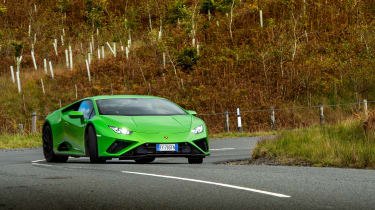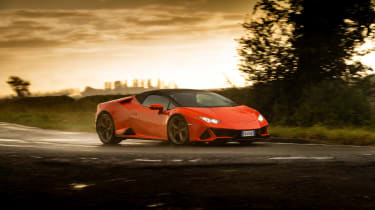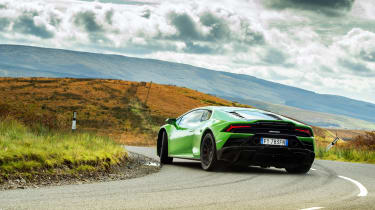Lamborghini Huracán Evo review – ride and handling
Once a medley of poorly calibrated elements masking a good chassis, Lambo’s engineers have fixed the quirks, allowing it to shine
There might have been some argument a long time ago that the Lamborghini Huracán started out life with one hand behind its back with its leaden nose and undesirable balance. Despite its new chassis and a thoroughly modern makeover, the Ferrari 458 Italia and McLaren MP4-12C by comparison seemed to operate at their own level, fighting amongst themselves in a rather more serious battle of wills. But 2021 sees a very different ecosystem. With both McLaren and Ferrari having done multiple updates, and both now on a different plane that seems more about numbers and speed, the Huracán entices in a rather different way, one that absolutely appeals to us.
The first thing that strikes you is how small the Huracán looks in the flesh. While it’s, of course, wider than your garden-variety hatchback, amongst the motorscape of 2021 it’s positively teeny. That also relates to the interior, which is unfortunate if you’re of larger stature, especially in the open-top variants. Once sitting low in the cabin though, the low scuttle doesn’t make things too difficult for the driver, although rear visibility is typically limited.
Yet on the move there’s an instantaneous change to your perception, as there’s now an instinctive and satisfying connection between you and the car. The suspension immediately feels superbly tied down, yet also with a new-found level of sophistication and fluidity that belies the tiny 30-section sidewalls of the front tyres. The steering, while still lacking the ultimate granular feel of a hydraulically assisted McLaren rack, is now easily up there with Ferrari’s units. There is a slight compromise on feel for the all-wheel-drive models, as these also feature rear-wheel steering which does cloud the feedback somewhat, but it’s not the deal-breaker it once was in those models, and nothing like as difficult to judge as the system in early cars.
More reviews
In-depth reviews
Reviews
But it’s the RWD and STO models that show the Huracán in its best light, as each in their different ways provides a new level of sophistication and detail that Lamborghini’s chassis engineers have instilled into what was once seen as a blunt instrument. They drive like they look, with a pointed and attentive front end that sniffs out grip from the road surface, with the tail providing all the grunt to back it up. Drive them with ham-fisted responses and they won’t respond with the supersonic ability of a McLaren 720S or Ferrari F8, but meet them at their level and they’ll excite and enthrall you in the most profound way.
The brakes, whether cast iron or carbon-ceramic, are also full of feel, with a solid pedal that’s at once reassuring and yet still able to give you a level of modulation that’s at one with the chassis. There are also the three driver modes, Strada, Sport and Corsa, but unlike in the Aventador there’s no individual mode that allows you to mix and match each of the powertrain and chassis elements. This means the most aggressive and outgoing powertrain setting, including its hilariously loud exhaust, is not available to be combined with a softer chassis setting for the road, while on the other hand, if your track day noise limits don’t like the loudest exhaust levels, you’ll have no choice but to slacken off the dampers and steering.
It’s very easy to get caught up in the cliche of unique passion that Italian manufacturers are able to instill in their cars, but the Lamborghini Huracán is one such car that proves it right, as even with a similar chassis, more useable interior and extreme styling, the Audi R8 just doesn't seem to appeal on anything like the same level.






